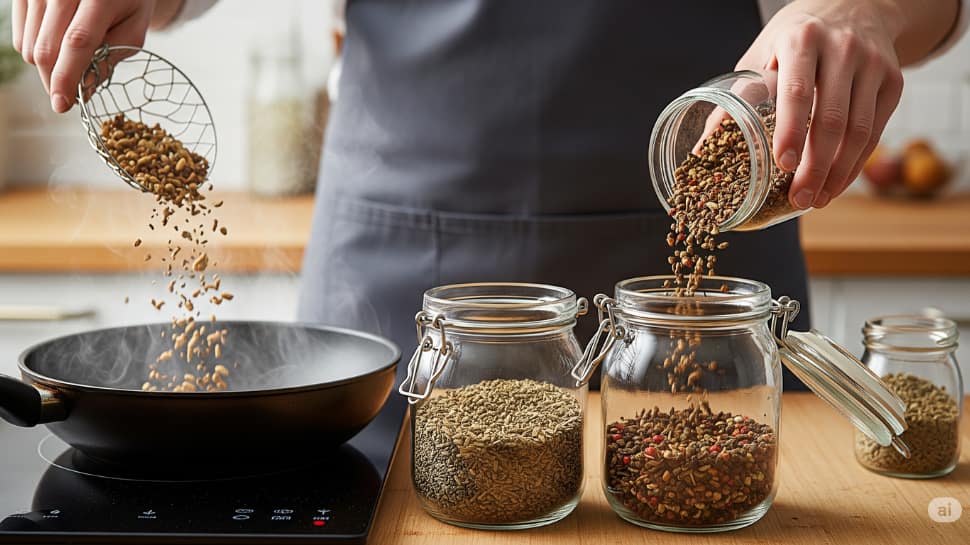Monsoon season brings moisture that can spoil your food quickly. Learn these 10 practical kitchen tips to keep your ingredients fresh and meals safe during the rainy season. From proper storage techniques to maintaining hygiene, these 10 tips help prevent spoilage, mould, and contamination, ensuring your kitchen stays clean and your food remains delicious despite the damp weather.
)
Containers: Air exposure allows moisture to spoil dry items like flour, sugar, and spices. Use glass or high-quality plastic airtight containers. Avoid loosely capped jars or paper packaging during monsoon. Place a small cloth pouch of rock salt or silica gel sachet inside the storage shelf to absorb extra humidity.

Pickles and Papads: Homemade pickles and papads absorb moisture and spoil quickly. Store in sterilized glass or ceramic jars, use only dry spoons, and keep in a dry, dark place. Add a layer of oil on pickles to preserve. Toast or sun-dry papads occasionally to keep them crisp.

Keep Spices Dry: Spices tend to clump or grow mold due to damp air. Lightly roast powdered spices before storing. This reduces moisture and extends shelf life. Store spices in glass jars, not metal, to avoid rust and contamination.

Clean and Dehumidify: Moist corners can promote mold growth. Wipe pantry shelves with a mix of vinegar and water, then dry thoroughly. Place activated charcoal, baking soda, or dry neem leaves in the corners to absorb dampness. Clean once every 7–10 days during the monsoon.

Store Grains and Pulses: Monsoon humidity can lead to fungal growth and insect infestations. Add a few bay leaves, neem leaves, cloves, or dried red chilies to your grain and pulse containers. These natural ingredients act as insect repellents and moisture absorbers. Occasionally sun-dry the grains for a few hours on dry days.

Use a Refrigerator Smartly: Overcrowding can reduce airflow and lead to uneven cooling. Don’t overload. Use transparent boxes to organize. Wipe vegetables and herbs dry before refrigerating. Keep a bowl of baking soda or coffee grounds in the fridge to absorb moisture and odor.

Handle Fresh Produce: Water droplets on veggies and fruits accelerate decay. After purchasing, wash and completely dry vegetables before storing. Wrap leafy greens in paper towels to absorb excess moisture. Storing overly ripe fruits with others, as they release ethylene gas and speed up spoilage.

Limit Stocking: Fresh items spoil faster in humid weather. Buy small quantities more frequently. Especially for dairy, bread, and meat, it is better to use fresh than risk spoilage. Keep dry and perishable foods in separate storage areas.

Raw Sprouts and Leafy Greens: These are highly perishable and prone to bacterial growth during monsoon. If using, boil sprouts instead of eating raw. Use leafy greens within a day or two of buying. Consider switching to healthier vegetables like bottle gourd, beans, or ridge gourd.

Well-Ventilated and Dry: Humid, poorly ventilated kitchens encourage mold, pests, and bad odors. Use an exhaust fan or dehumidifier if possible. Keep windows open when the rain stops. Mop spills quickly and wipe countertops with vinegar solution regularly.